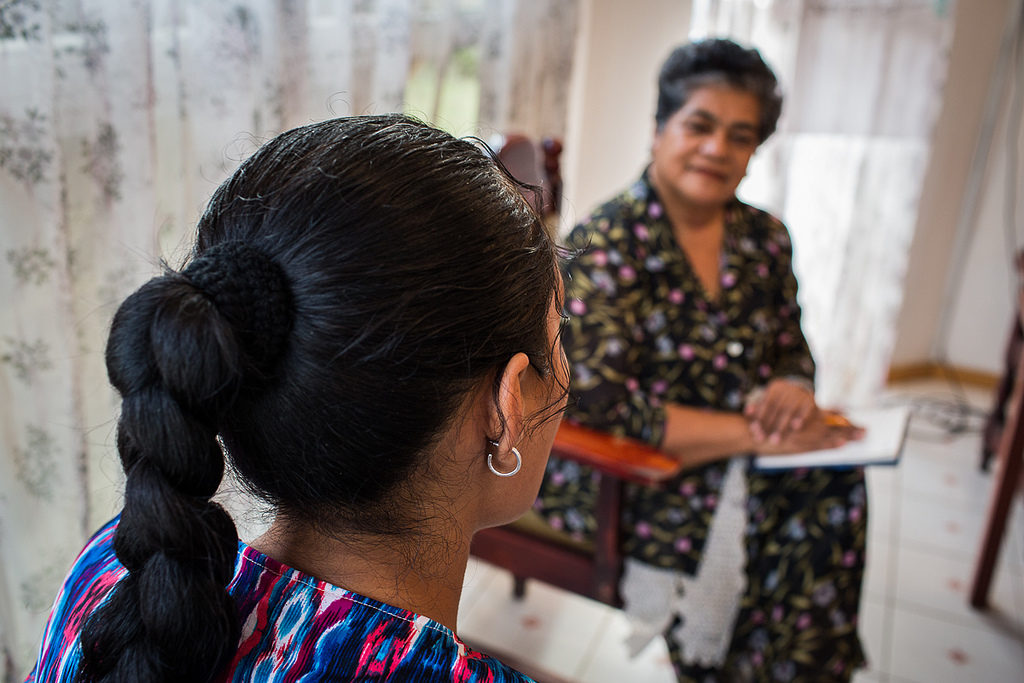
Domestic violence and abuse (DVA) is one of the most common human rights abuses worldwide, and affects nearly 2 million people in the UK every year. DVA includes controlling or threatening behaviour by a partner, ex-partner, or family member, and the abuse can be physical, sexual, emotional, psychological, or financial.
Although people of any gender or sex may experience DVA, the most frequent and severe DVA is perpetrated against women (Stotzer 2009, Walby and Towers 2017), and is consistently associated with grievous physical and psychological consequences.
Despite this, psychological services for women experiencing DVA are somewhat lacking. Specialist DVA advocacy services have long provided women experiencing abuse with person-centred emotional support, and advice on legal, housing, and financial matters. However, not all of these services accept women who are experiencing mental health problems, and only 22.8% have in-house specialist mental health support (Holly 2017). Similarly, mental health services often provide poor support for women with experience of DVA, sometimes either refusing to discuss abusive experiences at all (Trevillion, Howard et al. 2012, Scott, Williams et al. 2015), or providing responses that are victim-blaming and re-traumatising.
To remedy this gap in service provision, Roxane Agnew-Davies and colleagues have developed the Psychological Advocacy Towards Healing (PATH) intervention; a feminist, CBT-informed psychological intervention to be delivered by trained DVA advocates in specialist services. The intervention was trialled using a randomised controlled trial (RCT) and a nested qualitative study, the results of which were both published this week in PLOS One. An economic analysis will be published separately.

Domestic violence and abuse (DVA) affects nearly 2 million people in the UK every year, but psychological services for women experiencing DVA are somewhat lacking.
Methods
The RCT
This was a pragmatic, parallel group individually randomised controlled trial (RCT). Women over 16 who were seeking help from domestic violence and abuse (DVA) agencies in Bristol and Cardiff were randomised either to usual DVA advocacy alone (usual care), or to DVA advocacy plus up to 10 one-hour sessions (intervention) delivered by a trained specialist psychological advocate (SPA); the research team and statisticians were blind to group assignment. Women were excluded if they had a diagnosis of a psychosis, severe drug and/or alcohol problems, were unable to read English, or if they were already receiving psychological support.
Consenting women were administered questionnaires at baseline, 4 months, 8 months, and 12 months. Primary and secondary outcomes were measured at each time-point.
Primary outcomes included:
- Psychological distress (Clinical Outcomes in Routine Evaluation – Outcome Measure; CORE-OM)
- Depressive symptoms (Patient Health Questionnaire; PHQ-9).
Secondary outcomes included:
- Anxiety (Generalised Anxiety Disorder questionnaire; GAD7)
- PTSD (PTSD Symptom Scale; PSS)
- Quality of life (Short form-12; SF-12)
- DVA (Composite Abuse Scale; CAS).
Group differences in outcome measures at 12 months were analysed using intention to treat (ITT) continuous and logistic regressions, adjusting for site (Bristol/Cardiff), setting (refuge/community), and baseline values for outcome measures (to increase precision). The impact of adherence and missing data were also analysed using complier-average causal effects (CACE), and multiple imputation by chained models (mice), respectively. Fidelity was measured using a scale based on the revised version of the Cognitive Therapy Scale (CTS-R). Serious adverse events were also self-reported for assessment.
Nested qualitative study
A purposive sub-sample of PATH trial participants was recruited across a range of socio-demographic characteristics. Consenting women were invited to participate in semi-structured interviews at three time points: at the beginning and end of the intervention, and at 12 months’ follow-up (with equivalent for controls).
Interviews were conducted in a safe location with a topic guide, audio-recorded, and transcribed verbatim. Transcripts were coded and analysed from an interpretivist narrative perspective. A sub-sample of transcripts was double-coded to assess reliability, and emerging themes were defined by consensus. Authors were unaware of the trial results during qualitative data analysis (but aware during presentation of findings). The study was supported by survivors of DVA who gave advice on leaflets, topic guides and study processes.
Results
The RCT
263 women were consented and randomised between April 2011 and May 2013, 84% were white, and 64% participants were retained for the full 12 month follow-up. In some cases, it was impossible to establish the reason for loss to follow-up, as women had lost contact with DVA agencies. Women who were lost to follow-up were more likely to have been in refuges.
Both groups (intervention/usual care) had similar characteristics at baseline, and fidelity analysis indicated that SPAs broadly adhered to the session structure and content.
- Primary outcomes: The intervention group had a significant, 3.3 point lower mean CORE-OM score (OR=0.32, 95% CI=0.2 to 0.6) and a 2.2 lower mean PHQ-9 score (OR=0.4, 95% CI=0.2 to 0.8), compared with the usual care group at 12 months’ follow-up.
- Secondary outcomes: Measures of PTSD (PSS; OR=0.5, 95% CI=0.3 to 1.0) and mental health state (SF-12 mental; ß=4.6, 95% CI=0.05 to 9.2) were also significantly improved in the intervention group, though no significant differences were established for anxiety (GAD7), physical health state (SF-12; physical), or experiences of DVA (CAS).
- Impact of missing data: The multiple imputation for missing data gave lower point estimates for differences between groups on primary and secondary outcomes at 12 months’ follow-up, though all estimates were within the 95% confidence intervals of the original analysis.
- Impact of adherence: CACE results indicated greater benefit for those participants attending a sufficient number of SPA sessions (pre-specified as four or more; 55% of the intervention group).
- Serious adverse events: 32 serious adverse events were reported; four were considered potentially relevant to trial participation (all occurred in the usual care group) but the NHS research ethic committee judged that no changes to the conduct of the trial were necessary.
Nested qualitative study
21 women from the intervention group and 10 from the usual care group were recruited, but 62% of women were unable to participate in all three interviews.
Aspects of support most valued by women:
- Relationship with SPA or advocate: Women valued the knowledge and understanding of DVA advocates gained either through their work or lived experience. Women in the intervention group valued their regular and predictable contact with an SPA that was flexible around child-care, and spoke of how their person-centred, non-judgemental relationship felt like the opposite of abuse. Over time, women in the usual care group found it difficult that advocacy alone involved less regular and predictable contact.
- Emotional and cognitive outcomes: Women in the intervention group described a better understanding of abusive behaviours, as well as a reduction in self-blame and/or the need for self-medication with alcohol. In contrast, women in the usual care group tended to describe their physical progress (e.g. moving to safety) instead of their emotional improvements, often citing the lack of emotional-psychological support as a key deficiency in service provision.
- Key elements of the intervention: Women valued the “Duluth Power and Control Wheel”, writing down feelings/letters to the perpetrator to later destroy, and self-nurturing. Some women disliked the role play and anger work. Women completing the full ten sessions found it rewarding and emotionally challenging.
Reasons for non-adherence:
- Emotional stress: Some women felt as though the intervention was too emotionally demanding at this time in their lives.
- Psychological desire to move on: Women wanted to focus on the future rather than “digging up what I’ve buried”.
- Lack of continuity of SPA: Women were highly invested in their SPA, and therefore felt let down if there was a break in continuity of contact (e.g. between sessions, or due to SPA leaving the service/falling ill).
- Levels of engagement: Women varied in their preference for deep emotional engagement with their SPA. In general, those with long-term, recurrent or childhood abuse preferred this, and those without historic abuse were less keen on deep emotional work and preferred learning skills/self-help strategies.

Women in the intervention felt that their therapeutic relationship felt like the opposite of abuse.
Conclusions
The RCT
This study is the first RCT of a psychological intervention delivered by specialist mental health DVA advocates. Psychological distress, depressive symptoms, post-traumatic stress symptoms, and mental health state were significantly improved in the intervention arm at 12 months’ follow-up, but not anxiety, physical health state, or experiences of DVA. Results were attenuated when accounting for missing data and improved for those participants who attended more SPA sessions.
Nested qualitative study
Women receiving the intervention described improvements in their psychological wellbeing that may be difficult to quantify, such as the value of a safe, non-hierarchical, person-centred relationship with their SPA, and an improved understanding of DVA. Women receiving usual advocacy reported an unmet need for psychological support.

The PATH intervention significantly improved women’s mental health.
Strengths and limitations
The RCT
Cited strengths of this study include: recruitment of a large proportion of eligible women; successful collaboration with DVA agencies to deliver a psychological intervention; relatively complete data collection.
Cited limitations include: 34% women lost to follow-up, and the proportion of eligible women who did not participate. Also, the pragmatic nature of the trial entailed that intervention participants had higher levels of contact with services because they accessed SPA treatment in addition to usual care. The authors therefore state that they cannot exclude the possibility that the additional contact was responsible for the treatment effect, although the adherence results provide support for the efficacy of the intervention.
Nested qualitative study
Cited strengths include: repeat interviews that allow for reflection on earlier responses; the sample represented a broad array of women’s experiences of both study groups; the blinding of all authors to the trial results during analysis.
Cited limitations include: attrition, and the lack of ethnic diversity in the sample.

What’s the active ingredient? Does women’s mental health improve through psychological intervention or increased access to support?
Overall
I would add that additional strengths of this work include: publishing a study protocol (Brierley, Agnew-Davies et al. 2013); the rigorous analyses; and the large sample. Additional limitations include:
- The exclusion of women with a diagnosis of a psychotic illness, who are both likely to be experiencing DVA (Khalifeh, Moran et al. 2015) and are often excluded from research investigating psychological interventions for DVA (Yapp, Keynejad et al. in press).
- The exclusion of women with severe drug and alcohol problems, for the same reason as above (Engstrom, El-Bassel et al. 2012).

Excluding women with psychosis and substance misuse problems is common in research, but especially problematic in DVA research.
Implications for practice
These papers provide promising evidence for the PATH intervention. To my knowledge, this is the first RCT to evidence improvements in mental health outcomes at 12 months’ follow-up amongst women who are experiencing DVA at baseline (Yapp, Keynejad, & Oram, in press), and does so while boasting a strong methodology. The qualitative results strengthen those of the trial.
Women’s experiences of their relationship with their SPA are described as empowering, understanding, and non-hierarchical, which corroborates Concetta Perôt’s mantra (of Survivors’ Voices), that: “work with all people affected by abuse and trauma needs to look unlike and be the opposite of abuse” (Perôt, Chevous & SVRG, 2018).
As mentioned by the authors, there is some ambiguity as to whether the intervention results are merely down to women in the intervention having increased contact with a support worker (compared to controls). However, from the perspective of the DVA sector, this is somewhat irrelevant. The results of the PATH trial indicate that providing DVA agencies with increased resources (whether it is the psychological training, or the ability to meet with women for ten one-to-one sessions) both improves women’s experiences of those services, and improves their mental health. As funding is increasingly restricted for services such as these, this is an important finding, and I hope that the upcoming economic analysis is as favourable as the results herein, so that local authorities will take note.
I’d have liked to be able to read a bit more about how the women with lived experience supported the development of the qualitative work, but, despite this personal gripe, the results of this trial are clinically relevant, and this is an important victory for the DVA sector at a time that it so desperately needs it.

“Work with all people affected by abuse and trauma needs to look unlike and be the opposite of abuse” – Concetta Perôt.
Conflicts of interest
Emma Yap works with Louise Howard (co-author on the RCT paper) but had no involvement in this study. She also volunteers for Solace Women’s Aid; a third sector organisation providing support to women who have experienced domestic and sexual violence.
Links
Primary papers
Ferrari G, Feder G, Agnew-Davies R, Bailey JE, Hollinghurt S, Howard L, Howarth E, Sardinha L, Sharp D, Peters TJ (2018) Psychological advocacy towards healing (PATH): A randomized controlled trial of a psychological intervention in a domestic violence service setting. PLOS ONE 13(11): e0205485. https://doi.org/10.1371/journal.pone.0205485
Evans M, Malpass A, Agnew-Davies R, Feder G (2018) Women’s experiences of a randomized controlled trial of a specialist psychological advocacy intervention following domestic violence: a nested qualitative study. PLOS ONE 13(11): e0193077. https://doi.org/10.1371/journal.pone.0193077
Other references
Brierley G, Agnew-Davies R, Bailey J, Evans M, Fackrell M, Ferrari G, Hollinghurst S, Howard L, Howarth E, Malpass A (2013) Psychological advocacy toward healing (PATH): study protocol for a randomized controlled trial. Trials 14(1) 221.
Engstrom M, El-Bassel N, Gilbert L (2012) Childhood sexual abuse characteristics, intimate partner violence exposure, and psychological distress among women in methadone treatment. Journal of substance abuse treatment 43(3) 366-376. [NCBI Abstract]
Holly J (2017) Mapping the Maze: Services for women experiencing multiple disadvantage in England and Wales. London, AVA & Agenda.
Khalifeh H, Moran P, Borschmann R, Dean K, Hart C, Hogg J, Osborn D, Johnson S, Howard L (2015) Domestic and sexual violence against patients with severe mental illness. Psychological medicine 45(04) 875-886.
Perôt C, Chevous J & Survivors’ Voices Research Group (2018) Turning Pain into Power: A Charter for Organisations Engaging Abuse Survivors in Projects, Research & Service Development. Survivors Voices.
Scott S, J. Williams J, McNaughton Nicholls C, McManus S, Brown A, Harvey S, Kelly L, Lovett J (2015) A briefing for mental health professionals: Why asking about abuse matters to service users. Responding effectively to violence and abuse (REVA project) Briefing 3. DMSS Research, Truth Consulting, NatCen, and CWASU
Stotzer RL (2009) Violence against transgender people: A review of United States data. Aggression and Violent Behavior 14(3) 170-179.
Trevillion K, Howard L, Morgan C, Feder G, Woodall A, Rose D (2012) The Response of Mental Health Services to Domestic Violence: a qualitative study of service users’ and professionals’ experiences. Journal of the American Psychiatric Nurses Association 18(6) 326-336.
Walby S, Towers J (2017) Untangling the concept of coercive control: Theorizing domestic violent crime. Criminology & Criminal Justice 18(1) 7-28.
Yapp E, Keynejad R, Oram S (in press). Evidence-based interventions for the mental health consequences of IPV. Mental Health and Illness Worldwide. Mental Health and Illness of Women,. P. Chandra, H. Herrman, Fisher J. and A. Riecher-Rössler, Springer Nature. [Pre-order]
Photo credits
- Department for Foreign Affairs CC BY 2.0
- Photo by Jack Anstey on Unsplash
- Photo by Neil Thomas on Unsplash
- Chris Roe / Credit – Chadwicks

[…] A psychological victory for the domestic violence and abuse sector: the PATH trial. Available from: https://www.nationalelfservice.net/treatment/psychotherapy/a-psychological-victory-for-the-domestic-… Accessed 10 March […]